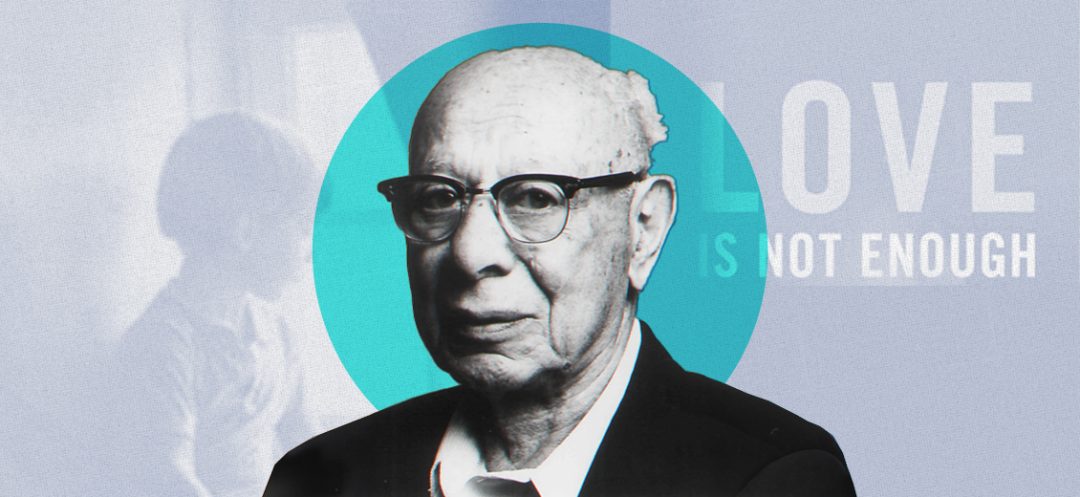Listen to the article
Every week, we invite you to explore a striking theme from a great psychoanalyst to reveal its depth and richness. These lapidary, often provocative formulas open up new perspectives on the intricacies of the human psyche. By deciphering these quotes with rigor and pedagogy, we invite you on a fascinating journey to the heart of psychoanalytic thought to better understand our desires, anxieties and relationships with others. Ready to dive into the deep waters of the unconscious?
Bruno Bettelheim recounted that, whenever he gave a lecture to parents in Chicago, there was always a mother who would ask him the following question: “And what about love?” To which he would reply, “Love is not enough,” the title he gave to his book on the therapy of severely disturbed children.
Nowadays, it’s not uncommon to hear parents declare that simply loving their children is enough for everything to go well, a belief encouraged by the reigning positivist movement. Parental love is seen as the cure-all, the key to a harmonious parent-child relationship and a smooth development. In Lebanon, many believe in unconditional parental love, even finding it in homemade dishes! But what is the true state of affairs?
We have already seen that love always comes paired with hate. It’s an inseparable couple found in all relationships, including those between parents and children. Unconditional love is an idealized nostalgia, somewhat like that Arlésienne* everyone talks about but never finds.
When it exists, parental love always contains an element of narcissism, that is, self-love through the other. The child is loved as an extension of oneself, as a flattering mirror in which the parent contemplates their own embellished image. “His Majesty the Baby,” Freud said, to describe the narcissistic omnipotence that parents often ascribe to their offspring.
This narcissistic love is not entirely negative. It is even necessary for the child’s proper development. It is because the child feels valued as a wonderful and unique being that they develop a sense of self-confidence and trust in life. The admiring gazes of their parents are the first mirror in which they learn to love themselves.
However, this passionate love also carries risks. It can lead to idealizing the child, imposing the parents’ unfulfilled dreams and ambitions onto them, and failing to recognize the child’s individual strengths and weaknesses which may diverge from the parental scenario. Finally, it can result in a lack of necessary boundaries, with parents giving in to every whim out of fear of losing the love of their precious child.
Herein lies the importance of authority, which should not be confused with tyranny. Authority must be understood as the mutual consent to a just law, to which both parents and children adhere. Children need an educational framework for love to bear fruit. Parents must know how to say no, to set structuring limits, even if this momentarily provokes anger or frustration in the child. As Françoise Dolto wrote, “What’s important is that a child can always say what they want, but not always do it.”
For it is also an act of love to know how to fairly set prohibitions on the destructive impulses present in every human being. Dolto spoke of “symbolic castrations,” those necessary renunciations that the child must undergo, with the help of their parents, to grow and achieve greater autonomy. Renouncing the maternal breast during weaning, giving up the pleasure of urinating and defecating in diapers during potty training, renouncing the exclusive possession of the parent of the opposite sex during the Oedipus complex… These are crucial stages where the child needs to be accompanied with both understanding and firmness.
This requires parents to correct their narcissistic love, to accept disappointing their little king or queen a bit in order to help them grow. It implies letting go of the mythical conception of a totally unconditional and selfless parental love. As Winnicott emphasized, the “good enough mother” is not a perfect and totally devoted mother but one who knows how to balance love and frustration, presence and absence.
We now know that true love is the one that recognizes the child’s right to otherness, the one that not only accepts but encourages their emerging desire to separate and forge their own path. Such love does not present itself as unique and exclusive but fosters the child’s integration into a human community made up of unique, different, yet similar, and always complex beings.
However, the balance between love and authority will always remain a difficult goal to achieve. The Hungarian psychoanalyst Sándor Ferenczi wrote that becoming a parent was much easier than being one. He added that parents tend to think that they inherently know how to educate their children, when in fact they do not. For, he pointed out, it is their forgetfulness of their own childhood that constitutes “the major obstacle preventing parents from understanding the essential questions of education.”
No parent can claim to succeed at this tightrope act every time. There will always be missteps, clumsiness, moments when one tilts to one side or the other. Parents must humbly recognize their role as apprentice-parents, requiring continuous introspection and questioning of their feelings and actions. They need to examine their relationship with authority, revisit the wounds of their own childhood, overcome their propensity for repetition and imitation, and develop an authentic relationship with their child. It is this constant inner journey that will help them grow alongside their child.
True parental love, neither blind nor suffocating, teaches parents to let go of the child’s hand when the child is ready to take their own steps. A love that remains behind the scenes, as a benevolent and discreet support. A love that rejoices in seeing the child move away and carve out their unique path. A love that understands that by accepting their own imperfections, parents create the space for the child to exist on their own.
In these conditions, the child will then be able to develop solid self-confidence. They will internalize a valued yet realistic image of themselves, accepting their limits and flaws, and learning to love themselves without indulging in the illusion of omnipotence.
Note: “Arlésienne” is a reference to a character everyone talks about but no one ever sees, originating from the French short story L’Arlésienne by Alphonse Daudet.



